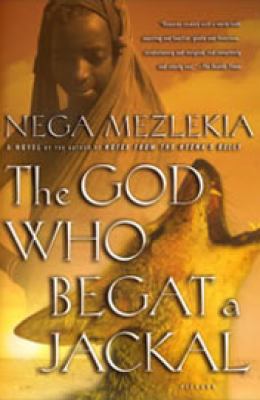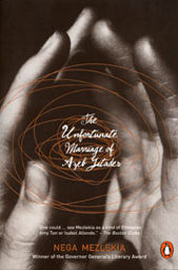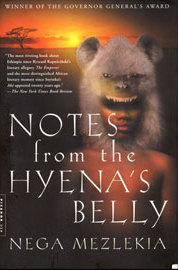Nega Mezlekia's Books

The God Who Begat a Jackal
In The Got Who Begat a Jackal, the seventeenth-century feudal system, vassal uprisings, religious mythology, and the Crusades are beautifully intertwined with the intense love affair between Aster, the daughter of a feudal lord, and Guru, the court jester and family slave. Aster and Guru’s relationship is the ultimate taboo, but supernatural elements galore presage a destiny more powerful than the rule of man.
With Mezlekia’s enchanting storytelling and ironic humour, readers glimpse African deities who have long since weathered away and the social cleavages that have endured through time.
“I love Nega Mezlekia’s THE GOD WHO BEGAT A JACKAL. It is wonderful how he conveys such generosity of spirit with his gorgeous, lush storytelling.”
- LORENE CARY, author of Black Ice and Pride
“The God Who Begat a Jackal is everything a novel should be. It delivers an entire world – a profound, comical, moving and memorable one. The moral and social truths of this novel – subtly and brilliantly evoked – are reminiscent of the novels of Tolstoy and Dostoevsky. Nega Mezlekia is a writer with extraordinary vision.”
- MARGARET CEZAIR-THOMPSON, author of The True History of Paradise
“Mezlekia portrays a world where magic and natural wonders are indistinguishable, where children walk through walls until they are taught that it is inappropriate to do so, where rulers and slaves are equally subject to the laws of nature and the humors of man. The God Who Begat a Jackal is a love story, a historical document, an anthropological exploration of the power of myth, and a warning by example of what might await a world that ignores the foreshadowing of religious war.”
- Therese Eiben, POETS & WRITERS
“Mezlekia has done it again. Spare yet lush, The God Who Begat a Jackal recreates a world that evokes the haunted but enchanting paradox that is East Africa. The envy is that his narrative voice rings so true – unique but universal and yet authentic to a particular time and place.”
- KEN WIWA, author of In the Shadow of a Saint
“The folly and brutality in this tale of star-crossed lovers and the brittle spoils of war resonate very clearly in our own time, and that’s no accident … Demons lurk and human flesh turns clear as glass in this long song of a novel. Its characters dwell in a world of magic and murder, potions and poison, riddles and divinations, and its fairy-tale quality suffuses not only the plot twists – duels, invisible ink, wild beasts that kowtow to our heroine – but also the language. English might not be the author’s mother tongue, but music lilts through … . That Mezlekia can sustain thrill, spell and doom for so long is a testament to his storytelling skill. … Mezlekia never descends to the heavy-handed lessons and paint-by-numbers description that other, more popular authors have done when attempting to immerse a largely white readership into another culture. He never stops his plot for blow-by-blow accounts of meals, costumes or rites, nor does he bother to translate each foreign word. We are expected simply to imagine. This respect for his readers’ intelligence creates a rare rapport, liberating Mezlekia’s scenery to unspool, on its own, in its own time, in our minds.”
- THE SAN FRANCISCO CHRONICLE
“This is an Africa rarely glimpsed: not quite colonial and not yet modern. Mezlekia’s Abyssinia is both feudal and ancient, pagan and biblical, and it often bears uncomfortable parallels to our own time. … tantalizing … we’re reminded, in Mezlekia’s seductive prose, of Herodotus and his credulity-teasing sagas of love, bloodlines and power. THE GOD WHO BEGAT A JACKAL is a tall tale imbued with documentary detail and the weight of history, and its story lines are as ancient as they are timeless.”
- THE LOS ANGELES TIMES BOOK REVIEW
“With a dose of magic realism that rivals his South American colleagues, Nega Mezlekia conjures in his debut novel an epic fairy tale set in pre-colonial Africa. This fable, more akin to Grimm than Mother Goose, is rife with erotic longing, political conspiracies, religious tyranny and unbridled sorcery. … Frequent, sprightly descriptions prove Mezlekia’s agility. The “twins were so emaciated that they cast no shadows,” he writes of two brothers, and the characterization is a fresh and simple delight. Such unassuming treats lighten the pall cast by the doom and foreboding that haunts this tale. Diviners and prophets are rampant in Mezlekia’s hands. And the legendary dimension, from the origins of the Mawu-Lisa religion to how to combat the ergums, or spirits, who exist between the dead and the living – though anchored in traditional folklore and historic fact – bestow an unbridled enchantment. … A beguiling and colorful parable whose end, though unhappy, is nevertheless is worth reaching.”
- HARTFORD COURANT
“Replete with the retelling of old legends and acts of magic realism. Spirits appear in whirls of dust, creatures like the Abettors decide wars, and magical potions revive the dying. … Luminously evok[es] a country where drought is endemic, the landscape austere, and food in short supply.”
- KIRKUS
“Mezlekia takes the elements of the simplest of fairy stories – forbidden love, an heiress and a storytelling slave – and embroiders them lushly. His heiress is the daughter of an African count, ruined at the age of 13 by the emperor’s lust, her skin turned transparent with shame until she is saved by the love of a court entertainer who can bring her fables, poems, history. But her world is threatened by an outburst of egalitarian religion and the Inquisition that intends to defeat it, led by a hunch-backed monk with a cartoon-book quality and a silver nose. … Splendidly exotic, set in a world of magic and fetish where cheetahs can sing and people rush away so fast they leave their shadows behind. Where enchanters grow fingernails at a foot a minute and a duke rides a three-legged zebra.”
- NEW YORK TIMES BOOK REVIEW
“December isn’t usually a wonderland for new books to be released, but there are late blooms worth harvesting. For a time, I had an editor who exhorted his writers to deliver articles brimming with “sweep and majesty.” I thought of him recently, as I strayed into the terra-cotta sunlight of Nega Mezlekia’s first novel, The God Who Begat a Jackal. Set in precolonial Ethiopia, it is an epic love story between a slave and the daughter of a feudal lord [whose] greatest fear is her father’s wrath. No one can escape the fates foretold by the gods, the castes assigned in 18th century society or the ravages of Ethiopia’s religious and ethnic conflicts. Mezlekia, who left Ethiopia in 1983 and now lives in Toronto, elevates his tale with generous servings of history, metaphor and magical realism. Beguiling and musical, his narrator’s voice stirs the veils of the story to comment on Ethiopia’s history of slavery and treatment of women of noble and peasant birth. I felt transported to an unfamiliar, magical place.”
- THE BALTIMORE SUN
“The language is entrancing … Mezlekia’s true achievement is in depicting a pre-scientific age, where diviners are called to solve human problems and animal sacrifices are the order of the day, all the while retaining some relevance to our modern age. … The God Who Begat a Jackal brings the reader face to face with personal treachery, backstabbing and pitched battles.”
- THE CALGARY HERALD
“Can you imagine men so thin from hunger they cast no shadows? Or the skin of an anguished woman turning glassy, allowing everyone to witness the underlying organs and veins of her body as she exposes her grieving heart to the world? Nega Mezlekia can … . Merging his natural yarn-spinning skills with the story-telling gusto of The Arabian Nights and the African folk narrative, Mezlekia also demonstrates an obvious debt to Gabriel Garcia Marquez, the Colombian novelist whose One Hundred Years of Solitude brought the magic-realist style of writing into full blossom 34 years ago. … The story of Aster and Gudu is as old as Ethiopia, one of the most ancient sites of human habitation in the world. … There’s food for many books in that outlandish, tortured country at the crossroads of several civilizations. Fortunately, it is also a land of laughter and tall tales, which Mezlekia innovatively blends with romance and post-modern intelligence into a swirling broth as dark and mysterious as the ergum, the devil-men who exist between the realms of the real and the unreal. … The God Who Begat a Jackal … weaves a spell-binding web of fabulous dreams and laughter, propelled by diamond-sharp images and a liberal sprinkling of witty, unpretentious remarks … [It] is a delight so rich with laughter and jeweled moments of beauty that its few, dusty flaws recede into the dark and magical Ethiopian night.”
- THE VANCOUVER SUN
“[A] POWERFUL TALE OF WAR, LOVE, HATE, FAITH AND BETRAYAL … As we learned to our sorrow in September, few of us pay attention to troubles in distant mysterious regions until they explode in our face. The challenge for any author bent on penetrating our stupor beforehand is to snap us awake and keep our eyes propped open, despite the depressing nature of the tales. … Think of any long-standing world conflict and this simple, but woeful story can be laid over it like a template. Mezlekia is only excavating and reconstructing war’s foundations. He starts with excessive pride and greed. He shows how it escalates with small inhumanities and treachery. How it bloats when self-serving zealots piggyback along. And how it goes on inexhaustibly because of appalling wounds, diabolical retaliations and the absence of sensible people willing to call ‘halt.’
Characters in The God Who Begat a Jackal are at once fancifully unique and eerily familiar. ‚Ķ Simmering truths about warfare are made more potent with dashes of magic realism. ‚Ķ In the way he focuses his theme, yet spins a complex tale, in the way he draws clear parallels with modern horrors, MEZLEKIA HAS WRITTEN AN EPIC THAT RUMBLES WITH THE STRENGTH OF SHAKESPEAREAN DRAMA. … This isn‚Äôt just a story about war, it‚Äôs a story about wars that we are witnessing in our lifetime, whether we are paying them heed or not.‚Äù
- THE EDMONTON JOURNAL
“CAPTIVATING … a book rich in magic realism which blends the history of pre-colonial Africa with mystical elements found in mythology and folklore passed down through generations. … Mezlekia has spun a tale of love against a backdrop of a war of religions in 18th century Ethiopia … If it’s true that an artist’s inner landscape is painted with the colour of home, and serenaded by the sights and sounds of years spent there, then Nega Mezlekia will be reciting tales of Africa for many years to come.”
- OTTAWA CITIZEN
“Due to his personal history, Mezlekia is uniquely placed to bring us an insider’s account of war. His experiences in Ethiopia, so different from those of most North Americans, have been transposed in this novel into something deeply and beautifully intelligible…A point of view that rewards readers with a world both startling and familiar, gentle and ferocious, revolutionary and resigned, and completely and utterly real.”
- THE SEATTLE TIMES
“Mezlekia transports readers to 18th-century Ethiopia, then called Abyssinia, where he unfolds a fable-like romance between a nobleman’s daughter and his slave…Rich storytelling instincts and sparkling prose.”
- WASHINGTON POST BOOK WORLD
“A magnificent joining of the oral tradition of storytelling and inquisitive determination of a historian….THE GOD WHO BEGAT A JACKAL is an all-encompassing, enriching tale that I thoroughly enjoyed and considered one of the best books of the New Year.”
- AFRICAN AMERICAN LITERATURE BOOK CLUB (March Book of the Month)
“THE GOD WHO BEGAT A JACKAL is no simple fairy tale. Mezlekia delivers a serious narrative, rewarding those who abandon themselves to the world he creates with a startlingly sharper insight into their own.”
- BLACK ISSUES BOOK REVIEW
“Mezlekia reinvigorates the classic themes of inequality, oppression, and forbidden love by placing them in the context of feudal Ethiopia…in today’s post-Sept. 11 world, [it] reminds us of the role of religious fundamentalism in propping up exploitative governments.”
- THE ANNISTON STAR
“THE GOD WHO BEGAT A JACKAL is ostensibly set in 18th century Ethiopia, but it’s really a marvelous fantasy world where gods are real and evil shape-changing spirits called ‘ergum’ stalk the countryside.”
- THE CAPITAL TIMES, Madison, WI
“[An] imaginative quasi-historical novel….Mezlekia offers great insight…into the historical sources of contemporary Ethiopian society, as well as an entrée into early modern Ethiopia, a time and a place still unknown to most Western readers.”
- LIBRARY JOURNAL (Best Books of 2001 Selection)
“Readers will be drawn onward by an inviting fragrance of romance and mystery.”
- PUBLISHERS WEEKLY

